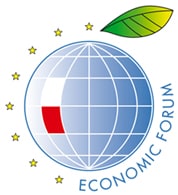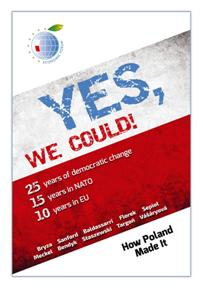
Joint event with Foundation Institute for Eastern Studies/ Economic Forum, Warsaw
 Yes, We Could! – 25 Years of Democratic Changes, 15 Years in NATO, 10 Years in EU. How Poland Made It.
Yes, We Could! – 25 Years of Democratic Changes, 15 Years in NATO, 10 Years in EU. How Poland Made It.
The event will marked the publication of a report by the Foundation Institute for Eastern Studies in Warsaw, co-financed by the Polish Ministry of Foreign Affairs.
5th November 2014
London Metropolitan University
The report comprises of a series of articles written by renowned Polish and foreign politicians, economists and columnists and presents political, economic, social and cultural changes that occurred in Poland over the past 25 years.
Speakers:
- Ms Katarzyna Krause, Counsellor, Head of Political Section, representing the Ambassador of the Republic of Poland
- Brendan Donnelly, Director, Federal Trust for Education & Research, United Kingdom
- George Sanford, Former Professor of East European Politics, University of Bristol, United Kingdom
Synopsis of the Report
These Polish anniversaries – 25 years of demographic transformation, 15 years in NATO and ten within the European Union – incline us to reflect on the changes that have taken place in Poland in the last quarter century. No one can see these changes better than those from abroad who saw Poland in the nineties and see the country now – a responsible member of the European community, a regional leader with a stable economy, and a reliable political partner.
A look from without gives a good perspective. There seems no better place to learn about the dynamics of change in Poland and the region than the yearly meeting in Krynica. For 24 years, during the Economic Forum, representatives of the world of politics, media, business, local government, people of culture and science have been coming together to meet in one place. Among them, closest neighbours from the Visegrad Group and the Baltic States, partners from the European Union, the United States and from beyond the eastern border. They all take part in numerous debates, meetings and conversations. Their observations and diagnoses can be inspiring, interesting and fresh. For this reason, we decided to invite some of them to contribute to this publication, which we now present to you.
Most of these people have known Poland for many years – like Magda Vášáryová and Matthew Bryza. Magda dedicated her book Sąsiad o północy (A Neighbour of the North) to Polish-Slovak relations. Matthew, before moving to Poland in the early nineties as an employee of the American Embassy, spent an unforgettable vacation here in 1979 traveling around the country with his parents. Today, visiting Warsaw, they see huge differences, about which they write in their articles contained in these pages.
But there are areas about which Poles need to shout about so that the world will associate them intimately with this country on the Vistula. Which is why we have invited a group of prominent Polish columnists to tell you, our readers, about the success of Polish programming or the global phenomenon of Polish theatre. Nor may we forget to show off the changes that have taken place in society itself – to this end, Wojciech Staszewski shows you what lies behind the mass rush of Poles to take part in sport and Senator Janusz Sepioł tells the story of the beginnings of Polish local governments.

